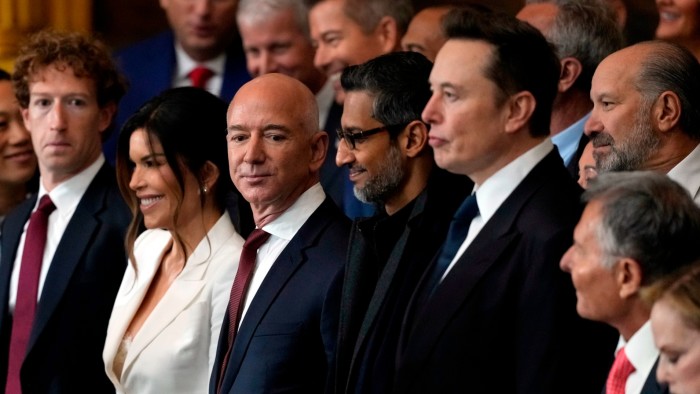Unlock the White House Watch newsletter for free
Your guide to what the 2024 US election means for Washington and the world
Donald Trump has ordered officials to draw up retaliatory measures against countries applying “extraterritorial” levies on US multinationals, in a move that threatens to trigger a global confrontation over tax regimes.
The US president made the move in an executive order on Monday night, withdrawing US support for a global tax pact agreed at the OECD last year that allows other countries to levy top-up taxes on US multinationals.
He added that the “list of options for protective measures” should be drawn up “within 60 days”, putting signatories to the OECD pact — including EU member states, the UK, South Korea, Japan and Canada — on notice that Washington intends far-reaching challenges to global tax rules.
Trump clashed with European leaders during his first term as president over proposed digital taxes that would affect big US tech groups such as Google’s owner Alphabet and Apple, threatening France at one point with tariffs.
His order on Monday includes investigating “whether any foreign countries are not in compliance with any tax treaty with the US or have any tax rules in place, or are likely to put tax rules in place, that are extraterritorial or disproportionately affect American companies”.
Former UK trade department official Allie Renison, now at consultancy SEC Newgate, said the move showed Trump was widening the “economic warfare” net far beyond tariffs in response to what the US sees as discriminatory practices from other countries. “Going after their domestic tax regimes off the back of hitherto global commitments shows Trump is getting creative in his fight to put ‘America First’,” she said.
“The economic warfare net is ever-widening well beyond just tariffs, and as governments start to consider their response, concerns will now pivot to what else might be caught up in retaliatory crosshairs — and the inevitable costs that go with it.”
The global deal agreed at the Paris-based OECD in 2021 and partly introduced by several countries last year was expected to raise the tax take from the world’s biggest multinationals by up to $192bn a year.
Under “pillar two” of the OECD deal if corporate profits were taxed below 15 per cent in the country where the multinational was headquartered, signatories could potentially charge top-up levies. But one part of the interlocking measures, known as the undertaxed profits rule (UTPR), has long drawn Republican anger, with the party labelling it “discriminatory”.
Grant Wardell-Johnson, global head of tax policy at accountants KPMG, said US responses could include imposing additional taxes on foreign-owned businesses operating in the US, or withholding taxes on payments to those jurisdictions.
“Ultimately we are seeing international taxation moving from a multilateral domain to a bilateral one based on strong unilateral assertions. It is a new taxation world,” he added.
Alex Cobham, chief executive of the Tax Justice Network, an international campaign group, said Trump’s move in effect left the OECD pact “dead in the water”.
In the two-part memo to the US Treasury secretary, Trump first ordered that commitments made by the Biden administration to the OECD pact be rescinded — a move that had been widely anticipated — but then broadened the scope of the attack.
Cobham said the potential scope spanned not just whether the OECD pact violated tax treaties, but at the extraterritorial potential of all tax rules in all countries.
“If you take this statement at face value, there’s every chance they come back in 60 days and say most counties of the world and most OECD member countries should be subject to the counter measures they’re talking about,” he said.
One senior EU official said Trump’s billionaire technology entrepreneurs were pushing him to act on tax rather than trade. “The conversation on tariffs will be transactional but the real fight will move to where fortunes are at stake and big tech has an interest,” they added.
Mathias Cormann, OECD secretary-general, said: “There have been concerns raised with us by US representatives about various aspects of our international tax agreement.”
He added the organisation would “keep working with the US and all countries at the table to support international co-operation that promotes certainty, avoids double taxation, and protects tax bases”.
Read the full article here




